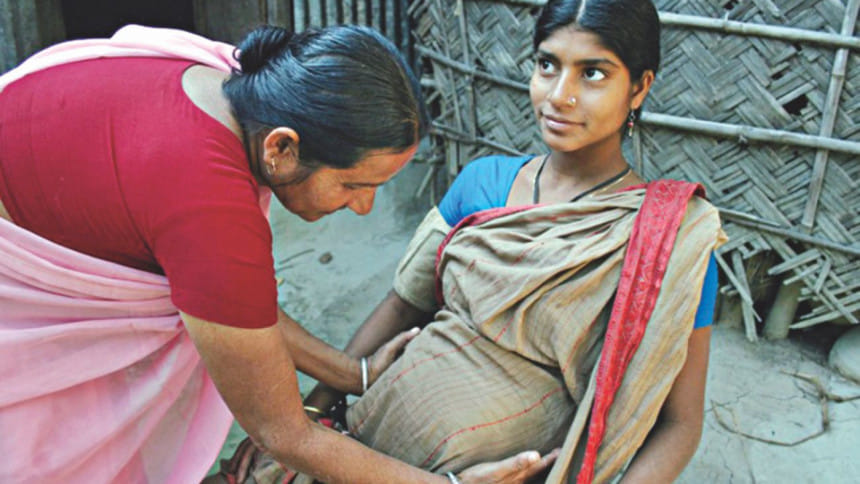Early pregnancy linked to low income

The government is working towards ensuring a women-friendly society. Gender-based violence is prevalent all over the world. The unpaid job of care-giving, mostly performed by women, is yet to be recognised. We have to change this situation.
Pregnancy before the age of 18 is prevalent among those with low per capita household income, revealed a survey.
The prevalence is the highest (46.3 percent) among the lowest per capita household-income group (less than Tk 2,500 per month), said the report.
It also revealed that among the participants, 35.8 percent of women in Bangladesh conceive their first child before turning 18. The highest incidence of early pregnancy was observed in Rangpur division (48.9 percent).
The findings of the report, titled "Monitoring the Implementation of SDGs for Ensuring Girls and Child Rights in Bangladesh", were shared at an event yesterday, jointly organised by Plan International Bangladesh, Aparajeyo Bangladesh, Yes Bangladesh and Youth for Change under the Y-moves Project.
All the organisations conducted the survey.
Shamim Ahmed, executive director of Yes Bangladesh, presented the keynote at the event.
The survey results show that decisions regarding family-planning methods are taken jointly by males and females in 69.3 percent of households. They mostly receive family planning information from television (53.7 percent), community workers (33.2 percent) and social media (29.5 percent).
Around 18 percent of the surveyed women faced physical violence over the last 12 months; 21.9 percent, the highest, reported physical violence in households with a per capita monthly income of less than Tk 2,500. In households with a per capita monthly income of more than Tk 10,000, physical violence was found to be the lowest (9.5 percent).
Among the surveyed women, 14.7 percent reported that they faced obstacles from male family members in terms of education and employment, which was found high in Mymensingh division (20.1 percent).
The findings reveal that about 46.2 percent of households have children who faced physical punishment and/or psychological aggression at home and outside (educational institutions, public places, transport, etc).
The survey was conducted between June 2021 and January 2022. A total of 3,175 households were randomly chosen and interviewed, especially women belonging to the reproductive age group (15-49 years) from 64 districts in Bangladesh.
Lawmaker Aparajita Haque, who is also a member of the parliamentary caucus of child rights and standing committee (post, telecommunication, and technology), said, "The government is determined to ensure the rights of women and girl children. This survey result will help us to enrich our efforts."
Lawmaker Adiba Anzum Mita, who was the special guest at the event, said, "The government is working towards ensuring a women-friendly society. Gender-based violence is prevalent all over the world. The unpaid job of care-giving, mostly performed by women, is yet to be recognised. We have to change this situation."
Kabita Bose, country director of Plan International Bangladesh; Dr Md Manjur Hossain, programme manager, MCH unit of the Directorate General of Family Planning; Ayesha Siddiquee, deputy director, Department of Women's Affairs; and Md Ariful Haque Mamun, deputy director (innovation) of the Governance Innovation Unit at the Prime Minister's Office, also spoke at the event.

 For all latest news, follow The Daily Star's Google News channel.
For all latest news, follow The Daily Star's Google News channel. 



Comments